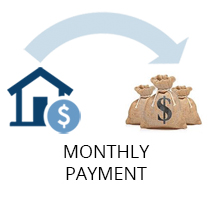Enjoy Financial Peace of Mind in Your Golden Years
Getting older can have its challenges. Between increased life expectancy, economic changes, health issues and divorce, many seniors find themselves struggling financially and falling short of their retirement dreams.
Now homeowners aged 60 or older may be able to improve their cash flow by paying off their current mortgage, getting a lump sum of cash, or even establishing a line of credit, back by their homes equity, with a reverse mortgage.
Two Different Reverse Mortgage Programs
We offer Regular Reverse Mortgage, also known as The Home Equity Conversion Mortgage (HECM) and Jumbo Reverse Mortgage two different reverse mortgage programs to meet your needs.
Both and Jumbo Reverse Mortgage share the following features:
Both loans require no monthly payment. You are responsible for property taxes and home insurance.
Both loans are due when you sell or leave the home.
You can use proceeds from either reverse mortgage anyway you want.
Jumbo Reverse Mortgage is an expanded program from the regular reverse mortgage program. It is designed for borrowers with high-value homes to access more of their home equity than they would with a regular reverse mortgage (HECM).
The main difference between a Regular Reverse Mortgage (HECM) and a Jumbo Reverse Mortgage is the maximum loan amount. The maximum amount a homeowner can borrow with a Regular Reverse Mortgage is $726,525. With Jumbo Reverse Mortgage, it allows homeowners to get as much as $4,000,000 based on age and home value.
Jumbo Reverse Mortgages have both adjustable and fixed interest rates. A Jumbo Reverse Mortgage doesn’t require monthly mortgage insurance premiums like a regular reverse mortgage does. So for those whose residence is worth more than a million dollars, you could have an ideal retirement lifestyle with a Jumbo Reverse Mortgage.
Regular Reverse Mortgage Vs. Jumbo Reverse Mortgage
Here are the key differences between a Jumbo Reverse Mortgage and a Regular Reverse Mortgage (HECM):
DISCLAIMER:
(1) at the conclusion of a reverse mortgage, the borrower must repay the loan and may have to sell the home or repay the loan from other proceeds;
(2) charges will be assessed with the loan, including an origination fee, closing costs, mortgage insurance premiums and servicing fees;
(3) the loan balance grows over time and interest is charged on the outstanding balance;
(4) the borrower remains responsible for property taxes, hazard insurance and home maintenance, and failure to pay these amounts may result in the loss of the home; and
(5) interest on a reverse mortgage is not tax-deductible until the borrower makes partial or full re-payment.
Reverse Mortgages Offer the Flexibility
to Meet Seniors’ Needs
You can take your reverse mortgage as a lump sum payment, a set amount each month, or as a combination of both.






